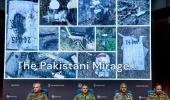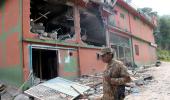'We've moved from thousands killed yearly in Jammu and Kashmir to 127 last year.'
'Cross-border terrorism in Kashmir is being solved. We are winning it.'

"We need to leverage all State instruments for economic erosion of the adversary, institutional erosion, escalating domestic political ferment, and sustained cyber interventions without any trumpeting," Dr Ajai Sahni, Executive Director, Institute for Conflict Management and one of India's foremost counter-terrorism experts, tells Prasanna D Zore/Rediff.
You have consistently argued that retributive strikes like Balakot or Operation Sindoor are theatrics with no lasting impact. What in your opinion constitutes an effective deterrence model?
We must adopt a protracted war strategy where we use more than just kinetic instrumentalities. We need to leverage all State instruments for economic erosion of the adversary, institutional erosion, escalating domestic political ferment, and sustained cyber interventions without any trumpeting.
The essence is that it's covert and deniable.
The adversary knows they're losing, being harmed, and paying for their actions. This must be sustained over years. I see the suspension of the Indus Water Treaty as one such instrumentality.
If we hold onto it long enough and complete works that Pakistan has blocked through delay tactics, even reducing water flows by percentages permitted under the treaty will do them tremendous harm. That's imposing a cost.
You must study the adversary's economy and identify multiple targets where intervention can make life increasingly difficult for them.
The formulation is that you exploit vulnerabilities and erode the strengths of the adversary system, correct.
Given your point about understanding vulnerabilities of an adversary, can Pakistan's poor economic health offer India's war against terror that leverage in dealing with cross-border terrorism?
Pakistan goes to the World Bank and IMF for loans every six months. They periodically need bailouts. Looking at their economic variables, the growth of poverty -- their economy is in total downslide. These vulnerabilities can be exploited further. You don't need to bomb a country.
You can undermine its military by ensuring no surpluses (resources to buy more arms and ammunition stockpiles to sustain a protracted military engagement with India) remain for them despite their military getting first pick of the budget; given even that budget is shrinking now, what can they do (with limited monetary resources)?
China, with all their 'all-weather friendship' and 'ironclad friendship' rhetoric, will take advantage of a weakening Pakistan. They are already colonising Pakistan. Modern colonisation only requires economic subordination.
You've criticised over-reliance on military options. What critical non-military levers -- diplomatic, intelligence, economic -- is India neglecting in handling Pakistan-backed terrorism?
These aren't things to discuss in detail publicly. We can outline strategy, but not operational and tactical interventions.
The categories are clear: Cyber, diplomatic, various subversive activities, political interventions. Their political difficulties (the tussle between the present government and imprisoned Imran Khan) and insurgencies (Balochistan and Tehrik-e-Taliban in Khyber Pakhtunkhwa) can be escalated.
Could the Indian military establishment be considering these options now?
They've always considered these options, but this isn't primarily a military or intelligence issue. It requires political mandate first, then resources for implementation.
The military doesn't decide who we go to war with or when -- they only determine what to do once war is declared. This is a covert war.
Does our military have institutions for these interventions? It doesn't. They have explicit kinetic capabilities and intelligence for defensive use only.
Do we need an ISI equivalent in the Indian Army? I don't think so. The civil intelligence sector should handle this, but they need enablement.
First, they need a clear mandate -- 'you are to do these things to Pakistan' -- then resources, institutional structures, and additional manpower.
Our intelligence apparatus is tiny compared to our country's size. R&AW (Research & Analysis Wing), our external intelligence agency, is a small group with under 10,000 people total -- including everyone from officers to peons and gardeners.

The Modi government presents Operation Sindoor as a calibrated escalation, with Pakistan responding similarly. Do you see a fundamental shift in India's counter-terrorism doctrine or is this merely optics?
Even if it's optics, understand that optics is part of warfare. The optics has changed dramatically (under the Narendra Modi government).
There is a fundamental change: Retaliation has become doctrine.
My issue is that I don't believe a one-off set of operations, however successful or widespread, will alter Pakistan's behaviour.
What definitive steps could India take to effectively address cross-border terrorism from Pakistan?
First, what does 'definitively deal with' mean? A solution is already in play.
We've moved from thousands killed yearly in Jammu and Kashmir to 127 last year. We had 16 years of high-intensity warfare, which is more than over 1,000 fatalities annually. Four years with more than 3,000 fatalities. In 2001, we had 4,011 fatalities and last year (in 2025) we (just) had 127 fatalities.
What you're complaining about is that we've cured cancer but still have a cold. (Cross-border terrorism in) Kashmir is being solved. We are winning it. We shouldn't let a terrorist incident, however horrifying, distract from this progress.
When you say Kashmir is being solved, did abrogation of Articles 370 and 35A help?
Not at all. It had no impact on Kashmir's terrorism trajectory whatsoever.
Is India always retaliatory in its approach?
Yes. We're retaliatory and defensive -- not just regarding Pulwama-Balakot and the Uri surgical strikes, but in everything. We don't take initiatives that would define outcomes.
There's a saying: If you don't have a strategy, you'll be part of somebody else's strategy. That's us -- always part of someone else's strategy.
Why can't we maintain focus on long-term strategies?
It's partly cultural, partly our political nature. In our democracy, we have elections every three months. Even local elections involve national leadership. The attention span isn't there, and we aren't strategic thinkers.
Our leadership lacks education -- that's a fundamental flaw. Even when we have leaders with capabilities, election-winning skills aren't the same as those needed to run government or defence programmes.
This specialisation is missing. People don't understand defence or the culture of the armed forces. They haven't properly studied Chanakya -- just a few lines here and there, or secondhand quotes. That book offers remarkable insights they'd never even consider -- like Chanakya's advice to accept the culture and religion of conquered peoples.










